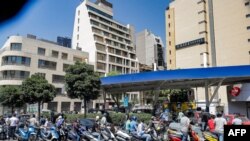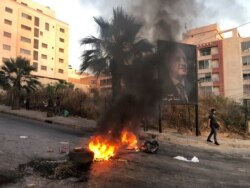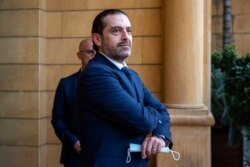Lebanon’s caretaker prime minister, Hassan Diab, warns of another “explosion” that could hit his country as tensions rise, with angry citizens waiting in line for hours at stations for meager gas supplies, while others scour pharmacies for unavailable medicine and baby formula. Power outages and a currency devaluation of 90% add to the Lebanese woes this long, hot summer, analysts say. Pressure is mounting on Prime Minister designate Saad Hariri to quickly form a Cabinet, something unachievable for nearly a year.
Lebanese protested Tuesday outside the Energy Ministry, calling their government’s electricity rationing harsh by only providing power a couple of hours a day. The shortage in the sweltering heat is fraying nerves, but also putting hospitalized patient lives at risk, especially as the delta variant of COVID-19 hits.
Professor Habib Malik of the Lebanese American University tells VOA the political elite supported by the Iranian-backed Hezbollah militia are to blame for Lebanon’s continuing dark descent.
“It’s multiple, parallel catastrophes. Pharmacies have no medicine. Medications are very scarce in supply, especially ones for chronic ailments, and this is endangering the entire population," he said. "Grocery shelves are empty. Prices are going through the roof. Fuel and other energy is scarce. It’s a disaster and much of it is completely unnecessary. But actually, it’s the result of a Ponzi scheme that this criminal mafia protected by the armed militia has perpetrated on Lebanon. And no one in the world seems to care. Everybody knows what’s going on and they just sit there.”
Writing in the Saudi Arab News, Baria Alamuddin says, “Hospitals are receiving only about two to three hours of electricity from the grid. There is no fuel for generators, in part because so much subsidized fuel is smuggled to Syria.” Observers say that government-subsidized medicine and other goods are also smuggled to neighboring Syria.
Alamuddin warns that “priority life-and-death institutions are a step away from grinding to a complete halt. Critical electronic systems at airport customs, the Ministry of Justice and public security centers have failed in recent days, because of electricity and supply shortages.”
Sunni Muslim Prime Minister designate Saad Hariri has been at loggerheads with Hezbollah backed-President Michel Aoun over the formation of a new government to tackle reforms demanded by the international community to release some $300 million in badly needed funds. But Malik says that Hariri himself is unable to fulfill the task due to his own political baggage.
“Hariri has all kinds of lawsuits pending. If the immunity of his position as prime minister designate is somehow canceled, he has problems with Turkey, Saudi Arabia, locally. If he is actually permitted to form a government, we don’t know if he will.
“The forces arrayed against him have been paralyzing the whole process, principally Aoun and his son-in-law. Hezbollah doesn’t even seem to care or want to do anything about this,” said Malik.
The United Nations says unemployment is estimated at more than 40%, while the majority of Lebanese can’t afford to adequately feed themselves. The financial crisis is posing the gravest threat to Lebanon’s stability since the 15-year civil war ended in 1990.














